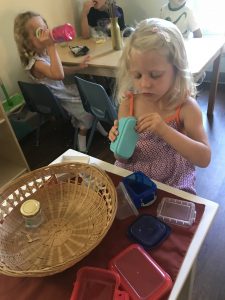
Opening and closing containers
The practical life section of the Montessori classroom is a popular and busy area. The purpose of this part of the curriculum is to allow children to learn and practice skills needed to become independent and to function as a contributing member of their family and society, thus it is sometimes referred to as “everyday living”. Every authentic Montessori classroom world-wide includes practical life lessons. They vary according to the skills children need to learn specific to their culture and environment.
Young children want to do things for themselves. We encourage and expect independence; therefore the curriculum includes opportunities for children to practice skills such as sponging, pouring, sweeping, buttoning, etc. Young children can easily manage the child-sized pitchers, bowls, and utensils. Control of movement is a goal so the skills are demonstrated modeling slow and precise movement which the child then practices until mastered. When one skill is mastered, such as dry pouring beans or rice, they are ready for the next challenge – a water pouring lesson may be next. Skills are at first isolated and then can be combined for more complex activities. For example, a child will practice using a sponge and pouring water and then can combine those skills to learn how to wash a table. Spills are OK – they learn how to sweep and mop too!

Learning to pour
Practical life work is not just for the younger children. Older children can learn to polish silver, pour through funnels, tie, use tools etc. The Elementary Montessori curriculum includes age appropriate practical life lessons to help children become capable and responsible adults.
This area is called “practical life” because the children are learning skills that are useful in their world. They want to become independent and to contribute to their family. Adults do a disservice when they do things for children that they are capable of doing themselves. Young children can help with simple household chores such as dusting, making their beds, feeding pets, setting and clearing the table, dressing themselves, etc. They can help with cooking, gardening and yard work. They can and should carry their own lunch boxes, water bottles and other items into school and be responsible for collecting their belongings at the end of the day.
Practical life lessons also help develop fine-motor skills, concentration, attention span and attention to detail. This area includes lessons in grace and courtesy as well. Learning how to greet visitors, meet new people, good manners, how to comfort a classmate, respect for one another and for the environment are some of the social skills children learn and practice. All the children enjoy the lessons in practical life, from the youngest who are dry pouring to the oldest children who are learning how to use a hammer. Water work can be very soothing for those needing something calming to focus on. It’s a busy place that the children never outgrow.

Washing a gourd

Using a whisk

Button Frame




Comments are closed.